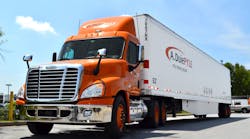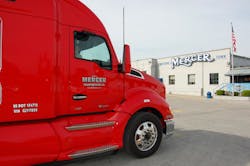Keary Mueller has worked in the trucking industry since the 1980s, and ever since he can remember, there’s always been a driver shortage.
Today, Mueller is chief operating officer of the Customized Solutions Group at A. Duie Pyle, a less-than-truckload (LTL) carrier fleet operating in the Northeast.
From his perspective, Mueller told Fleet Owner that driver turnover has always been about compensation for the time spent on the job.
So to keep its driver turnover rate under 10%, Mueller said Pyle offers plenty of incentives, including:
- Annual pay increases
- Driver training and its Truck Driving Academy
- Annual meetings to communicate strategic visions with drivers
- Driver survey process
“A happy employee is a profitable employee,” Mueller said. “I believe that you have to be willing to accept employee feedback and then follow up in that process. That’s what’s different at Pyle.”
Technology and capital investments are major players as well. Due to the ever-changing world of technology, there can be a lot of resistance and an initial pushback among drivers. However, Mueller said he has seen a higher acceptance, especially when in-cab devices and mobile apps help reduce paperwork and time.
“If you’re able to have a technological application that saves people time, that’s a win,” Mueller said.
Mueller advises against running a fleet of aging or poorly operating equipment, as it will drive qualified employees away. It’s about knowing how to track the resources you need and bring them to your company, he noted.
“The aging of the commercial truck drivers is here,” Mueller explained. “When figuring out how to attract the younger population and make the industry attractive, pay, technology and equipment are all important factors.”
Another carrier figuring out how to retain its drivers is Mercer Transportation is a Louisville, KY-based company that hauls mainly flatbed freight. The company relies on owner-operators exclusively and has 2,500 currently signed on.
Dale Corum, operations manager at Mercer, told Fleet Owner that keeping drivers is a challenge, particularly when becomes freight scarce and drivers look to other carriers.
“The good thing is a lot of them come back,” Corum said. “But that’s always a frustration. Anywhere you go, the pay is pretty close; we [carriers] are all fighting the same fight. From a dollars and cents perspective, if you work hard you can make good money.”
Brian Helton, Mercer’s marketing and media relations manager, said the biggest issue among drivers he sees is that they need more time to spend with their families.
In an effort to meet the needs of its drivers, Mercer started a mentoring program to share knowledge and training practices. Corum explained the program began a year ago as a way to provide drivers with mentors and more resources.
“If the drivers feel like we’re trying, that we heard their voice, that means a lot,” Corum said. “So we keep our ears to the ground. Mentoring is about sharing knowledge and we know it’s making a difference.”
Corum added that the company is expanding more into dry vans – it’s got 600 operating now and looking at potentially establishing a trailer pool. Many of its drivers are more open to dry van work, and because flatbed work is so physically demanding, Corum explained going to dry van allows drivers to work three or five more years before retiring.
Another big challenge Corum mentioned is figuring out how to help owner operators keep up with new rules and regulations, getting them to use new technology like ELDs, and providing them with safety training. He said Mercer is receiving some pushback from drivers regarding ELDs, but the company is mandating their use by July 1 this year.
“We need to convince the drivers we are fighting with them, not against them; we’re affected by the very same rules they are dealing with,” Helton explained. “All of our jobs need to be compliant.”
The changing driver pool is also presenting new challenges to Mercer and other carriers like it. Helton explained that some 20 to 30 years ago, a driver would change the brakes on his own truck. But that’s no longer the case.
A lot of drivers today don’t have that experience – that savvy – from growing up in trucking, Helton explained. That’s why companies like Pyle and Mercer have incentive-based and mentor-type programs in place – to retain the qualified drivers they do have and to keep them in the loop of what’s to come.





